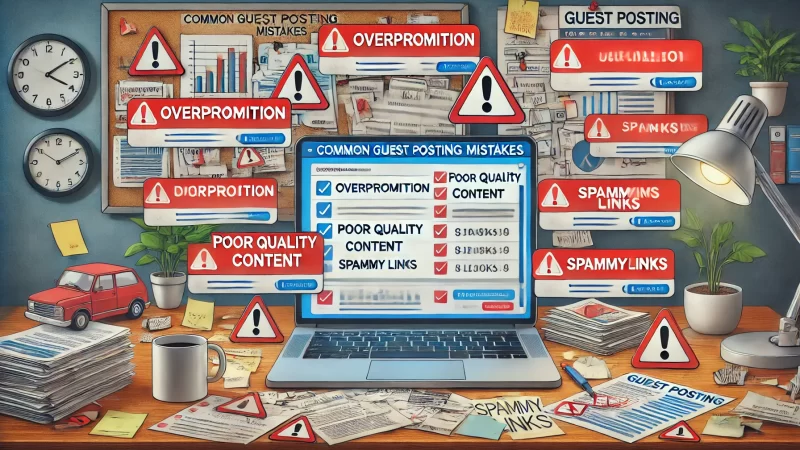Table of Contents
Are you wondering how guest posting can elevate your website’s trust score and overall SEO performance? Does the idea of leveraging guest posts to build authority and boost rankings seem intriguing but unclear?
In this guide, we will explore how guest posting works, why it is a powerful tool for enhancing your website’s trust score, and the exact strategies to make the most out of your guest posting efforts. By the end of this article, you will have actionable insights on how to use guest posting to boost your site’s SEO and credibility.
What Is Guest Posting And Why It Is Essential For SEO
Guest posting is a strategy where you contribute content to another website, helping both parties benefit from increased exposure. I find guest posting highly effective for enhancing website authority, driving traffic, and improving SEO. It connects your brand to a larger audience.
I recommend guest posting as it helps you build backlinks, which are critical for boosting your website’s search engine ranking. By contributing to reputable websites, you also demonstrate your expertise, establishing trust with your audience and search engines alike.
Defining Guest Posting For Effective SEO
Guest posting is when you write an article for another website, usually within your niche. This is a simple yet powerful way to get your content in front of a new audience while gaining a valuable backlink to your own site. I find that it’s one of the best ways to increase SEO.
When you focus on writing quality, insightful posts, search engines start to recognize your authority. You should target blogs that match your industry, ensuring relevancy and quality. This ensures the backlinks you receive are meaningful, which strengthens your website’s ranking.
I emphasize the importance of writing content that aligns with the host blog’s audience. You don’t want to write anything generic. Instead, I suggest focusing on content that offers genuine value, as this will encourage readers to visit your website and search engines to rank you higher.
Remember, quality trumps quantity in guest posting. I advise you to aim for well-researched, thoughtful articles that provide clear solutions to readers’ problems. This builds credibility for both you and the host site, benefiting both parties in SEO performance.
Lastly, use this opportunity to showcase your expertise. Guest posting not only helps you gain backlinks but positions you as a thought leader. Over time, this will significantly boost your reputation in your field, leading to greater SEO benefits.
How Guest Posting Impacts Trust Scores
Guest posting significantly impacts trust scores because it helps build high-quality backlinks from authoritative sites. I know that when search engines detect multiple trustworthy sites linking back to your site, they interpret this as a sign of your website’s credibility and relevance.
As your trust score increases, search engines rank your website higher for related keywords. I suggest being selective with the websites you post on—ensure they have a strong reputation. Low-quality backlinks can actually harm your trust score rather than help it.
Furthermore, guest posting allows you to tap into the authority of established sites. Readers tend to trust these sites, and if they see your content there, this trust transfers to you. I’ve seen firsthand how these endorsements work wonders for your SEO and online presence.
I advise you to always ensure that the content you provide aligns with the host site’s standards. Publishing on a site with high trustworthiness boosts your credibility. This, in turn, sends strong trust signals to search engines, making your site more authoritative in their algorithms.
Lastly, building relationships with credible blogs can lead to more guest posting opportunities. I recommend developing long-term relationships, as consistent guest posting on authoritative sites increases your trust score over time.
SEO Benefits From High-Quality Guest Posts
A high-quality guest post can drive significant SEO benefits by providing you with a valuable backlink to your website. These backlinks act like votes of confidence from other websites, which search engines consider when ranking your site. I always emphasize the importance of guest posts for this reason.
Not all backlinks are created equal, though. I suggest targeting high-authority websites to maximize SEO benefits. When the linking site has a strong domain authority, the impact of the backlink is more powerful. This can lead to increased traffic and higher search rankings.
I also find that guest posting allows you to create diverse backlink profiles, which is important for SEO. Search engines value backlinks from a variety of reputable sources. By contributing to different high-quality sites, you can diversify your link profile and improve your ranking.
Guest posts often bring in highly targeted traffic, as they are placed on relevant blogs. I recommend focusing on blogs within your industry to attract visitors who are already interested in your niche. This increases the likelihood of them visiting your site and engaging with your content.
Additionally, well-optimized guest posts can rank for their own keywords, providing another source of organic traffic to your website. I’ve seen guest posts generate sustained traffic over time, contributing to long-term SEO success.
Why Guest Posting Boosts Your Website’s Trust Score

Guest posting plays a crucial role in boosting your website’s trust score, which is a key factor in SEO rankings. I believe that by consistently contributing to high-authority sites, you position your website as a credible source, enhancing both visibility and trust.
When search engines recognize that reputable sites are linking to you, they see this as an endorsement of your content’s value. I always recommend targeting blogs with solid reputations to maximize the trust score boost from your guest posts.
The Role Of Authoritative Backlinks In SEO Growth
Authoritative backlinks are essential for SEO growth, acting as endorsements from trusted websites. I’ve noticed that the more backlinks you have from respected sites, the more search engines favor your website. This leads to higher rankings and more organic traffic.
Getting a backlink from an authoritative site signals to search engines that your site is valuable. I advise focusing on quality over quantity when securing these backlinks. A single backlink from a highly trusted site can often outweigh multiple low-quality ones in terms of SEO benefits.
When I discuss SEO strategies with clients, I always emphasize that backlinks should be earned through high-quality content. It’s not just about getting the link; it’s about making sure the link adds value. This is why guest posting is so effective when done right.
In addition to improving SEO rankings, authoritative backlinks help increase your site’s credibility. When other respected sites link to you, it shows that your content is trustworthy. This not only boosts your trust score but also improves user perception.
I’ve also found that backlinks from authoritative sites can lead to further opportunities, such as collaboration and networking. As more high-quality sites link to you, your website becomes a recognized authority, further enhancing your SEO growth.
Increasing Website Authority With Guest Posts
Guest posts help increase your website’s authority by placing your content on trusted platforms. I always suggest focusing on authoritative websites with a strong readership, as this builds your own authority in the eyes of both search engines and readers.
Your authority is further strengthened when these guest posts are linked back to your site. I’ve seen firsthand how even a few well-placed backlinks from high-authority websites can elevate a site’s perceived credibility and help achieve better rankings.
As your site’s authority grows, search engines reward you with higher visibility. I believe this visibility leads to increased traffic and, over time, more organic backlinks. The key is consistency in guest posting and targeting highly authoritative websites.
I also advise focusing on writing expert-level content that positions you as a leader in your field. By demonstrating your expertise through guest posts, you build a reputation that attracts both backlinks and new business opportunities.
Increasing your authority through guest posting is a long-term investment. I suggest patience and persistence, as the benefits compound over time, resulting in sustained SEO growth and a strong trust score.
Building Trust Through Strategic Outreach
Strategic outreach is key to building trust through guest posting. I recommend identifying blogs that are not only high in authority but also align with your brand’s values. Reaching out to these blogs with personalized pitches shows you’ve done your homework.
When you approach a site with a thoughtful, personalized outreach message, you increase your chances of getting accepted. I always stress the importance of highlighting what value your content will bring to the blog’s readers, as this establishes trust right from the start.
Establishing relationships with blog owners is a critical part of the process. I find that maintaining communication and showing appreciation for the opportunity to guest post can open doors for future collaborations, strengthening your trust score over time.
Once your guest post is published, I suggest promoting it on your social media channels and engaging with the blog’s audience. This further builds trust, as it shows you’re invested in the relationship and the community, not just the backlink.
Over time, strategic outreach combined with high-quality content helps position your brand as trustworthy. I emphasize this approach because it leads to lasting relationships, multiple guest post opportunities, and improved trust scores that fuel long-term SEO success.
Selecting The Right Blogs For Guest Posting Success
Choosing the right blogs for guest posting is a critical step for success. I advise targeting blogs that have high domain authority and are respected within your industry. This ensures that the backlinks you gain are valuable and contribute to your SEO growth.
To select the best blogs for guest posting, I suggest looking beyond just traffic. Focus on blogs that are relevant to your niche and have engaged audiences. This not only boosts your SEO but also increases your chances of reaching potential customers who trust these platforms.
Identifying High Domain Authority Blogs For Guest Posting
High domain authority blogs are those that have a strong reputation and are trusted by both users and search engines. I recommend using tools like Moz or Ahrefs to analyze a blog’s domain authority before pitching. The higher the authority, the more valuable the backlink.
Blogs with high domain authority often have strict content guidelines, so I suggest tailoring your pitch and content to their audience. Focus on delivering value, as this increases the likelihood of getting accepted. I’ve seen this strategy lead to higher-quality backlinks.
I also find it helpful to analyze the blog’s backlink profile to see which other sites link to it. If reputable websites are linking to the blog, it’s a good indication that your backlink from this blog will also carry weight. This contributes to both your trust score and SEO.
In addition to domain authority, I advise paying attention to the blog’s engagement levels. Blogs with active readers, frequent comments, and social shares tend to have more impact on your SEO. These interactions signal to search engines that the blog is well-respected.
Lastly, I recommend building relationships with high-authority bloggers over time. By consistently contributing valuable content, you can develop long-term partnerships that allow for multiple guest posts. This strengthens your backlink profile and enhances your SEO.
Analyzing Blog Relevance To Your Niche
The relevance of a blog to your niche is just as important as its authority. I always emphasize that guest posting on relevant blogs ensures the backlinks are seen as legitimate by search engines. This boosts both your site’s relevance and trustworthiness in your industry.
When choosing blogs to guest post on, I recommend researching their audience. Make sure that the blog’s readers are aligned with your target market. This ensures that the traffic you gain from the guest post is relevant and likely to engage with your content.
I suggest looking at the type of content the blog publishes. Does it align with your brand’s values and expertise? I’ve found that guest posts perform best when they are published on blogs that naturally align with your niche and audience.
Additionally, writing for niche-relevant blogs helps establish your authority in your field. I suggest focusing on blogs that are known for high-quality, informative content. This reflects well on your brand and increases the likelihood of readers trusting your site.
To maximize SEO benefits, I recommend targeting blogs that have both high authority and relevance to your niche. This ensures that the backlinks you gain are valuable and help to improve your site’s search engine ranking while also boosting your credibility.
Metrics To Evaluate Trustworthy Websites
Evaluating the trustworthiness of a website before guest posting is crucial for SEO success. I recommend using metrics like domain authority (DA), trust flow, and citation flow to assess a blog’s credibility. These metrics give insight into how trusted a website is by search engines.
One of the first things I look for is the website’s backlink profile. If the site has backlinks from spammy or low-quality sites, I suggest avoiding it. Low-quality backlinks can hurt your SEO, so focus on sites with a clean, trustworthy backlink profile.
I also recommend checking the blog’s traffic patterns. Sites with consistent traffic and engagement are more likely to have a positive impact on your trust score. Tools like SimilarWeb can help you analyze a blog’s traffic and user engagement metrics.
Another key metric I suggest analyzing is the blog’s social media presence. Websites that are active on social platforms tend to have engaged audiences. This not only boosts your guest post’s visibility but also signals to search engines that the site is reputable.
Lastly, I advise looking at the quality of the content on the blog. High-quality content indicates that the site is well-maintained and respected. I’ve seen that blogs with well-researched, authoritative posts tend to have better SEO and trust scores, making them ideal guest posting targets.
How To Craft A Compelling Guest Post For Maximum Impact

Creating a guest post that leaves a lasting impression is key to maximizing its impact. I suggest focusing on offering unique, valuable insights tailored to the host site’s audience. This will help you stand out and capture readers’ attention while enhancing your authority.
By ensuring your guest post aligns with the host site’s tone and content quality, you build credibility. I recommend keeping your content educational yet engaging, while subtly showcasing your expertise. This balance boosts trust, which is essential for improving your website’s SEO performance.
Writing Value-Packed Content For SEO Success
Writing guest posts that pack value into every paragraph is essential for success. I always advise focusing on offering actionable insights and addressing real-world challenges. Readers love posts that solve problems, which makes your content more shareable and impactful.
Additionally, high-value content naturally encourages backlinks and social shares. I’ve found that when you give readers something they can use immediately, they’re more likely to trust you and explore your website further, increasing your chances of converting visitors into followers.
One strategy I love using is incorporating real examples and data to back up my points. This not only adds depth to your post but also positions you as an authority. I suggest aiming for clear, concise writing that helps readers digest information quickly while retaining its usefulness.
Another effective tip is to structure your content with subheadings and bullet points. This makes your post easier to read and keeps users engaged longer. I know that an easy-to-read post encourages people to keep reading and often leads to better user interaction.
Finally, always consider your audience when crafting your post. What would they find most helpful? By putting the reader first, I’ve learned that your guest posts will naturally provide value, resulting in stronger connections and better SEO benefits.
Optimizing Guest Posts For Keywords And SEO
Optimizing your guest post for SEO is crucial to boosting its visibility and effectiveness. I advise starting by researching relevant keywords that both fit your topic and align with the host blog’s audience. This increases the chances of your post ranking for important search terms.
When placing keywords, I recommend a natural, non-intrusive approach. Avoid overloading the post with keywords—it should flow smoothly. I’ve learned that keyword stuffing not only irritates readers but can also harm SEO rankings, so aim for balance and readability.
Additionally, you should strategically place keywords in key areas like the title, subheadings, and introduction. I always make sure to integrate them without breaking the flow of the content. This helps search engines identify the topic of your post without sacrificing quality.
I find that adding internal and external links also strengthens your post’s SEO. Link back to relevant content on both the host site and your own site to boost authority and provide additional resources for readers. These links are key to gaining more traffic and credibility.
Finally, I suggest adding relevant images or infographics to your post. Not only do these elements enhance SEO through image alt texts, but they also engage readers visually, making your guest post more attractive and shareable.
Structuring Posts For Better Engagement And Trust
Structuring your guest post properly is essential for holding readers’ attention and building trust. I recommend breaking up your content into clear sections with subheadings. This allows readers to quickly find the information they’re most interested in, increasing engagement.
Short paragraphs work best, as they make your content easier to digest. I advise sticking to 2-3 sentence paragraphs to maintain flow and readability. This prevents your post from overwhelming readers, keeping them interested from start to finish.
In my experience, using a conversational tone can also build trust. I suggest writing as if you’re speaking directly to the reader. This personal touch helps establish a connection and makes your expertise feel more approachable and trustworthy.
Visuals such as images or bullet points also play a big role in engagement. I’ve found that when readers can quickly scan a post and find useful takeaways, they’re more likely to engage with the content. This not only increases the post’s effectiveness but also boosts trust.
Lastly, always conclude your post with a strong call to action. Encourage readers to explore more on the topic, visit your website, or engage with the content. I find that an effective CTA keeps the conversation going and helps you build lasting connections.
Strategies For Reaching Out To High-Authority Websites
Reaching out to high-authority websites is a critical step in successful guest posting. I recommend approaching it strategically, ensuring your pitches are personalized and well-researched. This increases your chances of being accepted, leading to stronger backlinks and credibility.
Targeting the right blogs is crucial. I suggest focusing on websites that not only have high domain authority but are also aligned with your niche. This ensures that the backlink you receive will have the most impact on your SEO and trust score.
Crafting Personalized Outreach Emails That Get Responses
Crafting personalized outreach emails can significantly improve your chances of getting a guest post accepted. I recommend addressing the blog owner by name and referencing specific content they’ve written. This shows that you’ve done your homework and genuinely appreciate their work.
I suggest keeping your email concise while clearly explaining the value your post would bring to their audience. Highlighting your expertise and offering unique insights can help you stand out from the crowd. I’ve noticed that personalization often leads to more positive responses.
It’s also helpful to include links to your best work. I find that showcasing previous guest posts or relevant content builds credibility. Blog owners want to see examples of what you’ve done before, as it reassures them that you’ll provide quality content for their site.
I recommend making it clear how your post would benefit their readers. Focus on what value your content will provide and why it fits well with their existing content. This approach shows that you’re thinking about their audience, which is crucial for earning their trust.
Lastly, always follow up politely if you don’t hear back. I’ve learned that persistence often pays off, as busy blog owners may simply need a gentle reminder. Following up shows your genuine interest and increases your chances of securing the guest post opportunity.
Building Relationships For Long-Term Guest Posting
Building long-term relationships with blog owners is key to securing ongoing guest posting opportunities. I suggest starting by engaging with their content before you pitch. Comment on their posts and share their work on social media to show your support.
Once you’ve been accepted for a guest post, I recommend following up with a thank you message and offering to collaborate again. In my experience, this kind of professionalism strengthens relationships, making blog owners more likely to invite you back for future posts.
I’ve also found that consistency is key to long-term success. Regularly contribute valuable content to the same blog, as this helps build your reputation and trust with their audience. It’s easier to gain repeat opportunities once you’ve established a solid working relationship.
I suggest keeping an open line of communication with the blog owner. Stay connected and ask for feedback on your guest posts. This shows that you value their opinion and are committed to improving your content, which strengthens your professional relationship.
Lastly, don’t hesitate to propose new ideas or offer suggestions for future posts. I’ve noticed that blog owners appreciate proactive contributors, and by staying involved, you can maintain long-term relationships that benefit both your SEO and your trust score.
Following Up Effectively To Secure Guest Post Opportunities
Effective follow-up is essential for securing guest post opportunities. I recommend sending a polite, concise reminder if you haven’t heard back within a week or two. This keeps you on the blog owner’s radar without being pushy or overwhelming.
When following up, I advise reiterating the value your post would bring to their audience. Highlighting the benefits can reignite their interest in your pitch. I’ve seen that focusing on how the post would serve their readers often leads to better outcomes.
I suggest offering additional ideas or suggesting an alternative topic if the original one isn’t a good fit. Flexibility shows that you’re willing to collaborate, which I’ve found can improve your chances of getting accepted.
Personalizing your follow-up is also crucial. I recommend referencing something recent, such as a post they’ve published or a piece of industry news. This shows you’re keeping up with their work and are genuinely interested in contributing.
Finally, patience is key. I’ve learned that persistence pays off, but it’s important to balance follow-ups with patience. Allow enough time between messages, and respect the blog owner’s schedule. A thoughtful, well-timed follow-up often leads to success.
Common Guest Posting Mistakes And How To Avoid Them

While guest posting is powerful, making mistakes can undermine its benefits. I recommend focusing on avoiding common pitfalls that can harm your SEO and trust score. By being aware of these errors, you can craft high-quality posts that boost your reputation.
Steering clear of mistakes such as posting on low-quality websites or duplicating content ensures your guest posting efforts remain effective and impactful. I advise always focusing on quality over quantity to build lasting trust and authority.
Avoiding Low-Quality Websites And Their Impact On Trust
Posting on low-quality websites can damage your trust score and hurt your SEO. I recommend thoroughly vetting each website before pitching. Look for signs like low engagement, spammy ads, or irrelevant content, as these indicate a poor-quality platform.
I’ve seen firsthand how posting on low-quality sites can lead to weak backlinks or, worse, penalizations from search engines. It’s important to avoid this at all costs by choosing reputable blogs with high domain authority. This ensures your backlinks are both valuable and trusted.
When evaluating a site, I suggest looking at its content quality. Low-quality content is a red flag. I recommend only contributing to blogs that consistently publish well-researched, informative posts. This guarantees your guest post aligns with reputable content standards.
I’ve also found that sites with poor user experiences, such as slow loading times or excessive ads, can hurt your credibility. I suggest avoiding these sites, as the user experience reflects on your brand and can affect how both readers and search engines perceive you.
Lastly, always assess the site’s backlink profile. If a blog is linked to by spammy or irrelevant sites, it could harm your SEO. I recommend using tools like Ahrefs to analyze a site’s backlink quality before deciding to guest post.
Steer Clear Of Duplicate Content In Guest Posts
Duplicate content can severely damage your SEO. I always advise creating fresh, unique content for each guest post. Reusing the same material across multiple sites can lead to penalties from search engines, reducing your visibility and damaging your trust score.
I suggest taking the time to craft original, tailored content for every guest post. In my experience, originality not only helps you avoid penalties but also engages readers more effectively, as they appreciate new and insightful information that hasn’t been rehashed.
I recommend avoiding spinning content or making minor changes to pass it off as original. This is still considered duplicate content by search engines and can lead to lower rankings. I always advise taking the time to write something unique that adds real value.
To steer clear of duplication, I suggest using tools like Copyscape to check your content’s originality before submitting it. I’ve found this extra step ensures that my guest posts are always fresh and compliant with SEO best practices.
Finally, keep in mind that duplicate content doesn’t just hurt your SEO—it can also damage your reputation. I advise focusing on originality in every guest post to maintain your credibility and trust with both readers and search engines.
Focusing On Quality Over Quantity For Trust Score Growth
When it comes to guest posting, quality always beats quantity. I’ve learned that publishing on fewer, high-quality sites is far more beneficial for your SEO and trust score than posting on many low-quality sites. It’s about where you post, not how often.
I recommend thoroughly researching each site before pitching. Focus on blogs that are highly respected in your niche, as these sites provide the most value in terms of SEO. A few well-placed, authoritative backlinks can make a huge difference in your search rankings.
I’ve seen that producing high-quality, well-researched content for guest posts builds credibility with both readers and search engines. When you prioritize quality, you’re more likely to gain long-term trust, which translates into better SEO and stronger backlinks.
Additionally, I advise taking the time to tailor each guest post to the host site’s audience. This ensures that your post resonates with readers and provides real value. I’ve found that when you focus on quality, the results are far more impactful and lasting.
Finally, quality guest posts often lead to more opportunities. I’ve experienced that blog owners are more likely to invite you back if you deliver valuable content. This not only builds your network but also strengthens your trust score with consistent, high-quality contributions.
How To Leverage Guest Posting To Strengthen Your Brand
Guest posting is an excellent way to strengthen your brand and increase visibility. I suggest focusing on creating content that showcases your expertise while connecting with new audiences. This helps build credibility and trust with readers and potential clients alike.
By consistently contributing to reputable websites, you position yourself as a leader in your field. I recommend targeting high-authority blogs that align with your brand’s values and expertise. This will help you expand your reach and establish a strong brand presence.
Building Brand Authority Through Expert Guest Contributions
Building authority through guest posting requires contributing valuable, expert-level content. I suggest focusing on solving problems or sharing industry insights to demonstrate your knowledge. This establishes your brand as a go-to source for reliable information in your niche.
When you consistently provide expert advice, readers begin to trust your brand more. I’ve found that this trust can lead to increased engagement and higher conversion rates, as potential customers are more likely to choose a brand they perceive as knowledgeable.
I always recommend sharing real-life examples or case studies in your guest posts. These not only make your content more relatable but also highlight your brand’s practical experience. It’s an effective way to showcase authority and create deeper connections with readers.
Offering actionable tips or strategies in your guest posts enhances your brand’s perceived value. I’ve noticed that readers appreciate when they can immediately apply what they’ve learned. This positions your brand as both authoritative and practical.
Lastly, being featured on respected platforms boosts your credibility. I suggest building relationships with top-tier blogs to get your content in front of a larger, more targeted audience. The association with well-known sites strengthens your brand’s authority.
Creating A Consistent Guest Posting Strategy
A consistent guest posting strategy is essential for long-term brand growth. I recommend setting a regular schedule for submitting guest posts to relevant blogs. This keeps your brand top-of-mind for both readers and search engines, boosting visibility and authority.
Consistency also helps build relationships with blog owners. I’ve found that regularly contributing high-quality content can lead to ongoing guest posting opportunities. This not only strengthens your SEO but also expands your reach across multiple platforms.
I suggest planning your guest posts around key topics within your niche. By covering a variety of subjects, you demonstrate the depth of your expertise while appealing to different audience segments. This diversified approach strengthens your brand’s authority.
Moreover, I advise tracking the performance of your guest posts to refine your strategy. Pay attention to which posts generate the most engagement or traffic and adjust your content accordingly. This ensures that your efforts are always aligned with your audience’s needs.
Finally, aim for quality over quantity. While consistency is important, I always prioritize creating valuable, well-researched content over rushing to publish. A few well-placed, impactful guest posts can do more for your brand than a large number of mediocre ones.
Establishing Thought Leadership With Guest Posts
Establishing thought leadership through guest posts involves sharing innovative ideas and unique insights. I believe that positioning yourself as a thought leader requires going beyond generic advice. Instead, focus on offering fresh perspectives that challenge the status quo.
Thought leaders are known for sparking conversations. I recommend writing guest posts that encourage discussion and engagement. When readers see your brand as a source of forward-thinking ideas, they’re more likely to follow you and trust your expertise.
Sharing your personal experiences or industry predictions in guest posts can also help solidify your role as a thought leader. I’ve found that when you provide a glimpse into your own journey or offer insights into future trends, readers are more likely to view you as an authority.
To establish yourself as a thought leader, I suggest being consistent in the types of guest posts you write. Focus on niche-specific topics where you have expertise, and always aim to deliver content that educates and inspires. This builds a reputation for thought leadership.
Collaborating with other thought leaders can further elevate your status. I’ve seen that co-authoring guest posts or participating in industry roundtables gives you credibility by association. This also exposes your brand to a wider, more engaged audience.
Measuring The Success Of Your Guest Posting Campaign

Measuring the success of your guest posting efforts is essential to understanding what’s working and where improvements can be made. I recommend tracking key performance indicators (KPIs) such as traffic, backlinks, and engagement to evaluate the impact of each post.
A thorough analysis of these metrics can provide insights into which types of guest posts are most effective for strengthening your brand. I believe that focusing on data-driven improvements can help you refine your strategy for even better results.
Tracking SEO And Trust Score Metrics After Guest Posts
Tracking SEO and trust score metrics after guest posts helps determine their effectiveness. I suggest using tools like Google Analytics and Ahrefs to monitor changes in your search rankings, traffic, and backlink profile. These insights reveal how each post contributes to your SEO.
I’ve found that keeping a close eye on your trust score is also crucial. A rise in trust score signals that search engines view your site as more credible due to authoritative backlinks. This can lead to higher rankings and increased visibility for your site.
Pay attention to the quality of the backlinks you’re gaining. I advise focusing on backlinks from high-authority sites, as these carry more weight in improving your SEO. Tracking these links will help you identify which guest posts are providing the best SEO benefits.
Additionally, monitor your domain authority (DA). I’ve noticed that consistent guest posting on authoritative sites can gradually boost your DA, making your website more attractive to search engines. This growth directly impacts your site’s trustworthiness and rankings.
Lastly, use tools like Moz or SEMrush to track keyword rankings. I recommend checking if the guest posts are helping you rank higher for specific keywords. Improvements in rankings indicate that your SEO strategy is working effectively.
Analyzing Traffic And Conversion Rates From Guest Posts
Analyzing traffic from guest posts is a key indicator of success. I advise using Google Analytics to track referral traffic and assess which posts are driving the most visitors to your site. Understanding which blogs and content types perform best allows you to fine-tune your strategy.
In addition to traffic, I suggest focusing on conversion rates. It’s important to track how many visitors from guest posts take desired actions, such as subscribing to your newsletter or making a purchase. This reveals whether your content is not only attracting but also engaging users.
I’ve also found it helpful to analyze the behavior of visitors from guest posts. Tools like Hotjar can show you how these visitors interact with your site. Knowing what pages they visit or where they drop off helps you optimize your site for better engagement and conversion.
I recommend setting specific goals for each guest post, such as increasing email subscribers or sales. Measuring against these goals allows you to determine the post’s ROI. In my experience, the most successful guest posts lead to both increased traffic and conversions.
Lastly, segment your traffic data to see if certain guest posts attract different audience segments. I’ve found that understanding these demographics helps tailor future content to better target specific user groups, improving overall effectiveness.
Monitoring Backlink Profile Growth From Guest Posting
Monitoring your backlink profile is crucial for evaluating the long-term benefits of guest posting. I suggest using tools like Ahrefs to track new backlinks from your guest posts and analyze their quality. This ensures that your guest posting efforts are improving your SEO.
I’ve seen that a diverse backlink profile is key to strong SEO performance. Make sure your guest posts are building links from a variety of reputable websites. This increases your credibility with search engines, leading to improved rankings over time.
Keeping track of lost or broken backlinks is also important. I advise regularly checking your backlink profile for any dropped links and reaching out to the blog owner if necessary. This helps maintain the integrity of your backlink profile and ensures consistent SEO growth.
I recommend assessing the anchor text used in backlinks as well. Ensuring that it includes relevant keywords can further enhance your SEO. I’ve found that optimizing anchor text can improve your search rankings, especially when linked to high-authority pages.
Lastly, keep an eye on competitors’ backlink profiles. I often analyze where they’re gaining links and look for opportunities to contribute to the same sites. This competitive analysis helps strengthen your backlink strategy and improve your search engine performance.
The Long-Term SEO Benefits Of Guest Posting
Guest posting provides significant long-term SEO benefits when done consistently. I believe that by steadily building high-quality backlinks, you’ll improve your domain authority and rankings over time. This leads to sustained organic traffic and increased online visibility.
The cumulative impact of well-placed guest posts can be substantial. I recommend focusing on creating a long-term guest posting strategy that prioritizes quality, consistency, and relevance to maximize SEO benefits over the years.
Why Consistency In Guest Posting Leads To Sustained SEO Gains
Consistency in guest posting is key to achieving long-term SEO gains. I’ve noticed that regularly contributing to reputable blogs keeps your content fresh and maintains your presence in your niche. This helps you steadily build backlinks and improve your search engine rankings.
I suggest developing a monthly or quarterly guest posting schedule to ensure consistency. When you post regularly, search engines take note of your ongoing contributions, which can lead to better indexing and higher rankings for your site.
I also recommend focusing on building relationships with the same blogs. Consistent contributions to a few high-authority sites strengthen your backlink profile and trustworthiness. I’ve found that this approach leads to more significant SEO improvements over time.
In addition, I advise keeping track of your performance and refining your strategy as needed. By regularly reviewing your guest posts’ impact, you can adjust your approach to maximize the SEO benefits and continue gaining traction.
Lastly, stay patient. SEO improvements from guest posting take time, but I’ve seen that consistent efforts result in long-term gains. Keep delivering high-quality content, and your SEO results will steadily grow, providing sustained visibility and traffic.
Increasing Trust And Visibility With Regular Contributions
Regular contributions to guest blogs can significantly increase both trust and visibility. I suggest focusing on building your reputation by contributing insightful, value-packed content. This helps readers see your brand as a reliable source of information, boosting trust over time.
I’ve found that frequent guest posts help establish familiarity with your audience. When readers consistently see your name and content, they’re more likely to trust you and engage with your brand. This increases your visibility across your niche.
Frequent contributions also strengthen relationships with blog owners. I’ve experienced that these relationships can lead to more guest posting opportunities, further expanding your reach and authority. The more visible you are, the more trustworthy your brand becomes.
Moreover, regular guest posting builds domain authority over time. The more backlinks you earn from authoritative sites, the more visible your website becomes in search results. This visibility translates into higher rankings and increased organic traffic.
Lastly, I recommend using guest posts to showcase your brand’s values and expertise consistently. When you present a clear, authentic message across multiple platforms, you not only gain trust but also solidify your brand’s reputation in the industry.
Building A Diverse And Credible Backlink Portfolio
Building a diverse and credible backlink portfolio is essential for long-term SEO success. I recommend focusing on earning backlinks from a variety of high-authority sites in your niche. This diversity helps improve your search rankings and boosts your website’s credibility.
I’ve found that guest posting on different blogs allows you to tap into various audiences. This broadens your reach while ensuring that your backlink profile is well-rounded. The more diverse your links, the stronger your SEO performance.
In addition to diversity, I suggest prioritizing the quality of the backlinks you earn. High-authority sites provide the most SEO value, so aim for reputable blogs. I’ve noticed that backlinks from well-respected platforms carry more weight and lead to better search engine results.
Tracking your backlink profile is also key to maintaining its credibility. I always recommend using tools like Ahrefs or Moz to monitor the quality and relevance of the links you’re earning. This helps ensure that your backlink portfolio remains strong over time.
Lastly, avoid over-relying on one source for backlinks. I suggest spreading your guest posts across different sites to avoid a concentrated backlink profile, which can appear unnatural to search engines. A diverse portfolio signals trustworthiness and strengthens your SEO.






